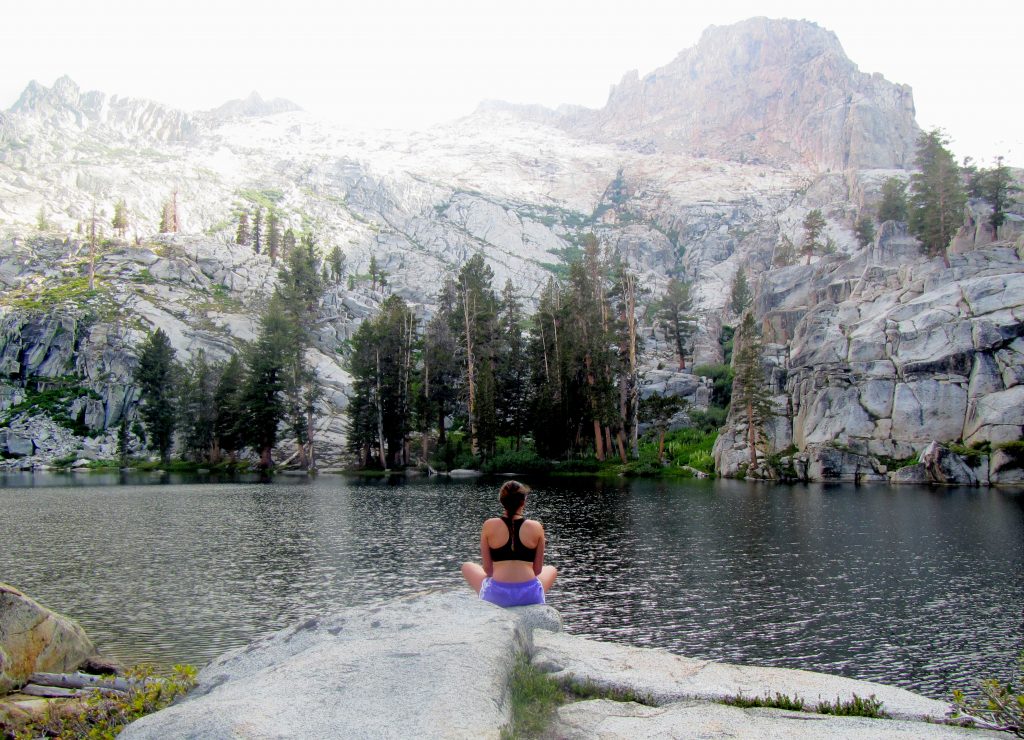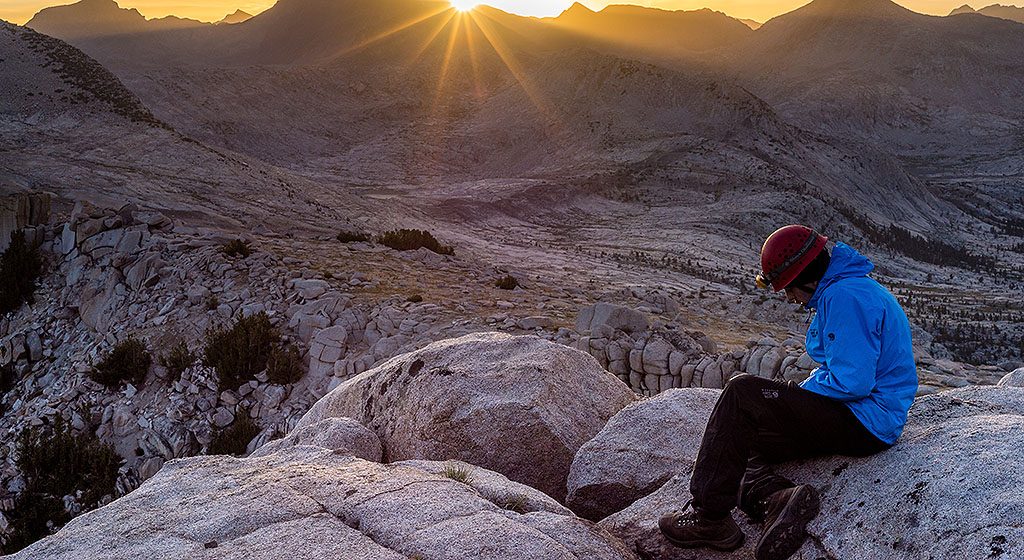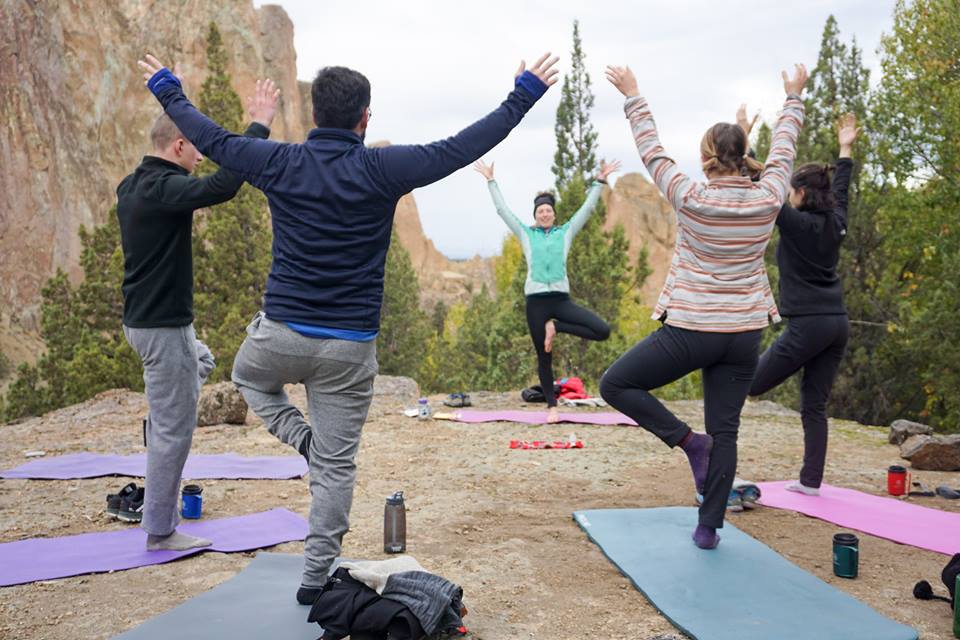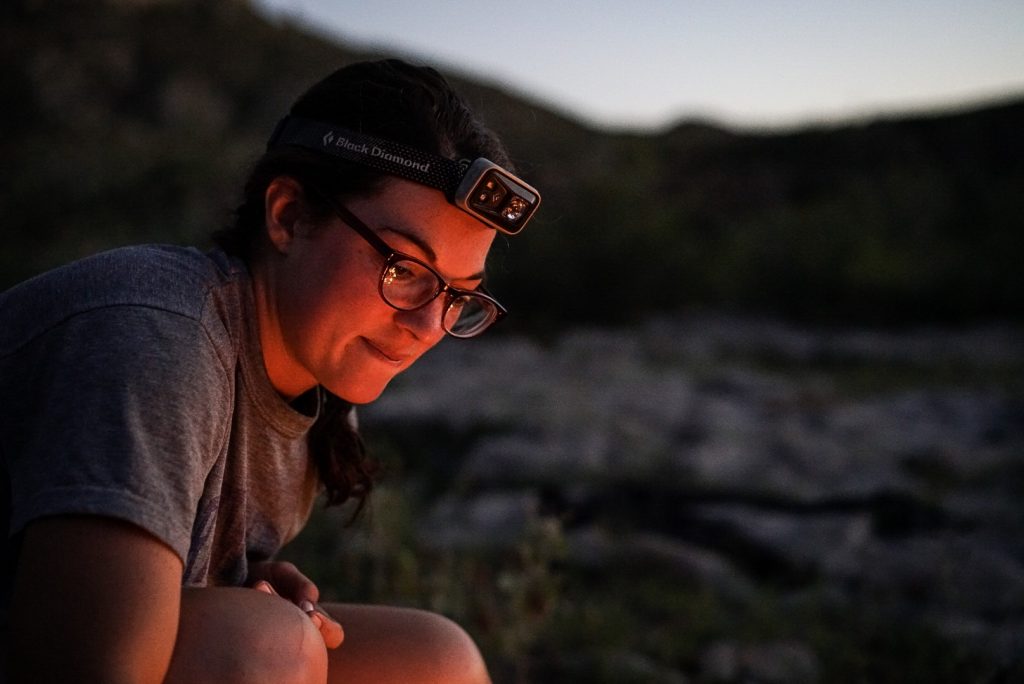Right now, I am preparing for a 24-day backpacking expedition with six teenage students. As I think about what comes in the next 24 days, I pack my pack carefully. At the bottom of my 70 liter pack is my sleeping bag. Inside my sleeping bag I have a pair of wool socks—my “sacred socks” that will stay there the entire trip. Sitting on top of my sleeping bag, there is a ziploc bag containing wet wipes, a book that my friend wrote, ear plugs, tiger balm and a journal with a picture of my family in it. These items were all carefully placed and selected based on who I am and what I need. They are items that will specifically address my cold feet, my super keen hearing and my need to feel connected to those who are not with me in the wilderness. They are important to me, and one of my foundations of my self-care is making sure that I have the things I need and where I need them before the course even begins.
When I first began instructing wilderness expeditions, I had a very basic understanding of self-care. On my first course, I remember being so consumed with my students’ needs that I actually felt paralyzed, spending ten minutes just staring at a tree during dinner time as I ate my macaroni and cheese. I was so focused on making the expedition powerful for my students that I did not understand the little practices I could do to make myself feel more present, healthy, and engaged. As I learned more about myself, I started to add new elements of self-care to my courses, which in turn, gave me more mental freedom to grow as an Instructor.
I have gone through many different self-care phases. I have brought vitamins on a course, written hugs into my daily schedule and used sketchbooks to record my thoughts. On one expedition, five days in, I asked my co-Instructors if we could switch the book we were reading to our students because it was making me feel sad. I felt silly at first for feeling so strongly about such a minute subject, but my co-Instructors were so supportive that it made me feel even sillier for not asking sooner. And the most incredible part about making that small request was that it truly made a difference. The moment that book changed, my nighttime reading sessions got 10 times better and my mood improved.
As Outdoor Educators, we love what we do. But it often falls on our shoulders to make this challenging job sustainable and fulfilling, even when things get hard. Below are some strategies, tips and tricks I have developed to maintain my self-care. Although I have adapted these tools to fit my personal needs, most of them I originally observed in other Instructors who I owe a huge amount of gratitude and thanks to.
Types of Self-Care
I am not an expert on self-care. I am okay at it, sometimes. And perhaps, because I am “okay at it, sometimes,” I have sought out more advice on self-care than your average outdoor educator. What I do know is that self-care can be very hard to learn, and very hard to maintain. In order to help maintain my own self-care, I have broken up my self-care into three types:
- Rituals
- Physical self-care practices
- Emotional self-care practices
I use this structure because I can easily forget my own goals and fall into a cycle of exhaustion. Not everyone needs or wants to participate in an organized self-reflection, and making lists of all your “self-care tools” is not for everyone. But for me, these categories remind me of how I can take care of myself while on an adventure, and what tools I can use to promote my own health and happiness, even in challenging moments.

Rituals
Rituals are the “no matter what’s” of self-care. I developed this category for myself after observing other educators in the field. Over time I noticed that many have created a set of consistent self-care practices for themselves. They fulfill a need for normalcy and routine in a sometimes chaotic, nomadic lifestyle.

Photo by Rikki Dunn
Rituals might be physical health routines, like washing your face, or stretching every morning, or they might be mental health routines like taking small breaks throughout the day, or writing letters home. My rituals are very simple, but they serve as my baseline. Their absence can be an indicator of my own exhaustion or impending burn-out. For example, if I skip one of my rituals, it gives me a clue that I am being stretched too thin. From there I can consider asking for help, or taking a closer look at whether I am getting my needs met.
My rituals are simple:
- Brush and floss my teeth at night
- Change my clothing before bed
- Make a cup of instant coffee in the morning
Physical Self-Care Practices
Instructing in the outdoors is exhausting. We put our bodies through unusual levels of stress while still using our intellect to teach, manage risk and mitigate conflicts. Because of this, sometimes our bodies give out on us. I have seen outdoor educators struggle with injuries, sleep deprivation, allergies, illness, food sensitivities and more. There are so many ways to feel bad, and not always enough solutions to feel good. I don’t have an exhaustive list of how to stay physically healthy but I do have lists that are specific to my own physical self-care challenges.

Unlike rituals, this list changes depending on where I am and how I am. It is a set of tools that I can draw on, should the need arise. For example…
To Promote Better Sleep:
- Wear earplugs
- Use the bathroom before sleeping
- Read to my students
- Tuck students into bed, so they sleep better, so I sleep better
- Use essential oils
- Read a book
- Brush my hair
- Clean my feet
Emotional Self-Care Practices
I feel incredibly lucky to get to do this work. Working as an outdoor educator for Outward Bound has changed my life, challenged me, scared me and made me cry. It is a true gift. But it is hard. Emotional self-care is by far the most diverse, and most exciting form of self-care. I have seen emotional self-care be silly, serious, stoic, angry, joyful and hilarious. Just as we often teach our students to use soothers to help them calm down, we also find them useful when being an Instructor feels like it is too much to handle. The following are some of my personal favorite emotional self-care practices.
- Ask for what you need
- Sing
- Yell
- Take a moment to walk away
- Cry if you need to
- Write a letter home
- Speak in a different accent
- Take a deep breath
- Talk to co-Instructors about non-course related topics
- Talk to co-Instructors about what is happening on course
- Clip your nails
- Throw sticks at a tree
- Complete physical tasks (setting up tarps, cooking dinner etc.)
- Bring photos of loved ones to look at
- Draw
- Read
- Exercise

Photo by Ben Koshnick
Outdoor Educators have challenging jobs. We work long hours, with mandatory night shifts. We rely on our bodies to lift canoes, hike hundreds of miles, and climb cliffs. We do all this while managing groups of people who can range from quite easy-going to quite a lot to handle. And for many of us, it is in our nature to push ourselves to our limits. Because of that, our self-care is incredibly important to our well-being and ability to continue performing our duties as educators. And although we may not know at first what we need, we can support each other in developing those skills from course to course, from base to base, and from person to person.
About the Author
Rebecca Fenn is an outdoor educator, originally from California, who instructs for NYC Outward Bound Schools and North Carolina Outward Bound School. After graduating from University of Chicago with a major in Human Development, Rebecca worked in college admissions and then began her journey toward outdoor education. She became the Life After Eagle Rock Fellow at Eagle Rock School and Professional Development Center, a wilderness-based boarding school in Estes Park, Colorado. There she taught at-risk students “Math for Life” and served as both a college counselor and as a vocational counselor to prepare them for life after Eagle Rock. Upon receiving a Master’s Degree in Education Policy from Harvard, she decided to delve deeper into the Expeditionary Learning model by taking on the challenge of becoming a Field Instructor for Outward Bound. Rebecca is a cartoonist, artist and writer, and loves the challenges and rewards of working with youth in the outdoors. She is always interested in learning more about educational systems, cultures and practices in the United States.




